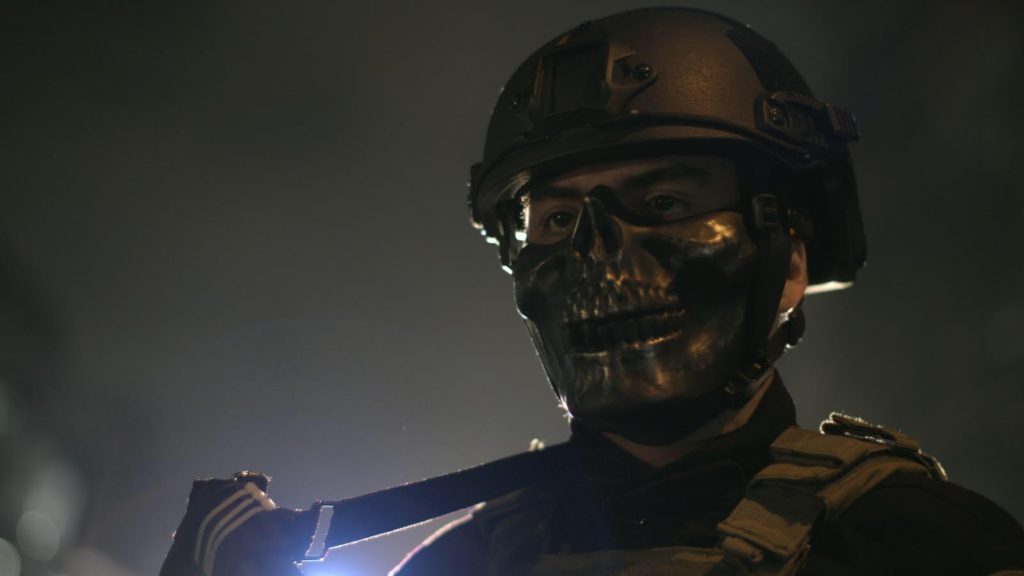Directed by Olivier Sarbil and James Jones, this sick, thrilling and gripping documentary tells the scathing story of President Duterte’s bloody and very violent campaign against drug dealers and addicts in the Philippines. On The President’s Orders givs the viewer an unprecedented and intimate observation into both sides of the war – the Manila police, and an ordinary family from the slum who have suffered from the loss of a father assassinated in broad daylight. The film uncovers a murky world where crime, drugs, and politics meet in a deathly embrace – and reveal that although the police have been publicly ordered to stop extra-judicial killings, the deaths continue.
The documentary starts in chilling fashion with the president delivery a speech where he essentially compares his crusade against the country’s drug delears as Hitler’s genocide of the Jews. It’s chilling stuff to hear and it sets the mood of the film. Duterte rose to power on a pledge to rid the country of dealers and addicts alike, in any form possible. He essentially gave the police force free rein to do as they please. This resulted in the police executing thousands of people over an 18-month period. This sounds like the premise of a grim, near future dystopia much like The Purge but it is a reality for many in the Phillippines.
Although Duterte is a clear-cut villain, the other individuals featured in this documentary aren’t as easy to decode. The film follows Jemar Modequillo, who was the police chief appointed to clean up the vast, troubled Manila district of Caloocan in 2017. Modequillo’s position came to be after the sheer scale of deaths in the first year of Duterte’s campaign became too heavily criticized by the public. And for a little while, the body count seems to drop for a period. However, the war may have simply gone underground and the executions have become dirtier.
We also follow Axel and Fujiko, whose father, one of many on the police’s watch list, is shot dead in broad daylight. In one of the film’s most chilling and hard-hitting scenes, we see the CCTV footage of this execution, with Axel’s and Fujiko’s younger brother being in the same cab as their father. The next day the police closed the investigation into the murder. Axel is certain Modequillo’s forces are responsible and as a result, he is pushed further into a life of crime. It’s a bitter cycle and a sad fact of life that a life of crime inevitable for some. The documentary also features a funeral director who runs a 24-hour funeral service, for him business is booming. It’s slightly disturbing to see how there are those who are profiting from this misery.
On the President’s Orders looks like a thriller from the likes of Michael Mann or Christopher Nolan, and it is just as gripping as Heat (1995) or Inception (2010). This is a slick and stylish documentary, with extraordinarily high production values. This is a documentary that is worthy of your complete attention and focus. You will become immersed in this world of drugs, crime, and corruption. The only downside is the fact that the documentary is quite short in its runtime, but it is always a good sign to be left wanting more.
James Jones’ has had experience in tough environments. He has made films about police shootings in America, suicide in the military, wars in Ukraine and Gaza, and undercover investigations in Saudi Arabia and North Korea. Sarbil has also covered conflicts and critical social issues across Asia, the Middle East, Africa, Europe, and North America. The film’s strength lies in Jones’ and Sarbil’s direction.
The film has truly brilliant cinematography, that manages to bring us into this world of shadows and crime. Very early on, Sarbil shoots a nighttime raid that the police conduct with such intensity and craftsmanship that it is truly on-the-edge-of-your-seat stuff. The cinematography wouldn’t look out of place from an action film or a video game. It is worth mentioning that Sarbil won a cinematography Emmy for his and Jones’s 2017 Frontline episode on Mosul.
Special mention must go to Michael Harte’s editing. Harte has had extensive experience in editing a number of BAFTA and Grierson-nominated documentaries for BBC and Channel 4. And it is worth mentioning the score by Uno Helmersson, who is an award-winning Swedish composer whose credits include the worldwide hit tv series The Bridge.
Overall, On the President’s Orders doesn’t exactly shed any new light on the human rights crisis in the Philippines, which may disappoint those who would be expecting a more hard-hitting journalistic piece. However, this isn’t to say that On the President’s Orders isn’t effective. Like The Brink, this is another documentary reflects the populist movement that is sweeping across the globe and the power of propaganda. On the President’s Orders is a film that Hollywood should be envious of and a film that you should defininetly seek out.

